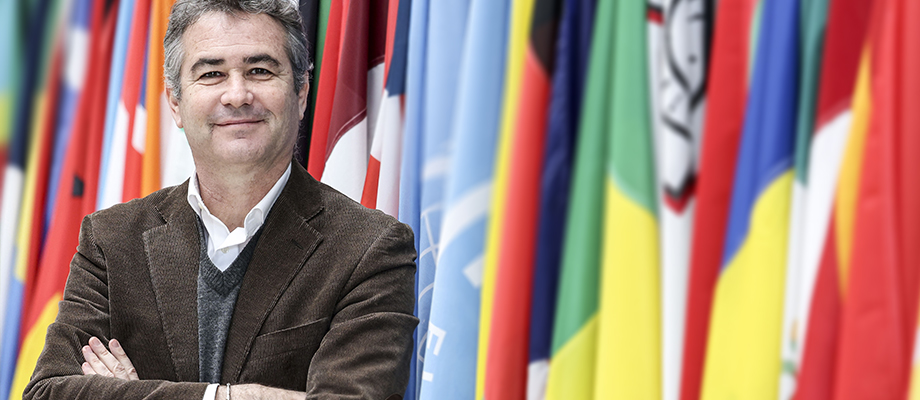Investment Centre welcomes new head of West and Central Africa Service

The Investment Centre is strengthening its ability to respond to the growing and evolving needs of countries and investors. Alessandro Marini, who recently joined as Chief of the newly created West and Central Africa Service, shared his thoughts on the importance of embracing change and taking risks.
Tell us about yourself.
I am originally from Milan, Italy, but I married a Roman woman, and all my kids were born in Rome, so I am half Roman, half Milanese. I am an economist, though my interests lean more towards the social science side of economics. My work experience has been quite diverse, both in terms of institutions and countries. I have worked for NGOs in various countries in Africa; for Mozambique’s Ministry of Agriculture as a technical assistant; and as a freelance consultant for several International Financing Institutions, such as the World Bank and the International Fund for Agricultural Development (IFAD). From 2000 to 2002, I was a long-term consultant with the FAO Investment Centre, carrying out Economic and Financial Analyses for investment projects. For the last 15 years, I was Country Director at IFAD. I have lived in Mozambique, Tanzania, Uganda, the Philippines and, most recently, in Côte d’Ivoire. Despite my diverse experience, my career path has been consistently focused on economic development and investment project design.
How is the Centre’s current transformation strengthening its ability to provide effective solutions?
The Centre’s transformation, organized around the ‘4+2 solutions’, is what attracted me most to this job. It is an exciting time to be here. The Centre’s team is growing, expanding its work with new partners, like the European Investment Bank and Cassa Depositi e Prestiti, among others, while strengthening collaboration with our more traditional financing partners. It is also venturing into new thematic areas, like the digitalization of rural services, carbon finance, blended finance and the sustainable production and commercialization of major commodities. On that last point, I am thinking specifically of our work with partners to create sustainable cocoa value chains in Cameroon, Côte d’Ivoire and Ghana, which is extremely relevant and where we can provide added value.
One area where I think we can step up our work is our direct engagement with governments – supporting them in their strategic investment planning, projects and policies. If we want to be catalysers of investment and finance solutions, the key is to work directly with governments. We need to position ourselves as their main partner of reference when it comes to the transformation of agrifood systems. Some countries in our region, like Côte d’Ivoire, will soon become middle-income countries, andsome already are. The trend is for countries from the region to have increasing capacity to self-finance and implement their own investments. So, the opportunities are there we just need to equip ourselves to be ready to respond to them.
What do you feel are the Centre’s strengths?
The biggest strength is by far its staff – their technical competence, multi-disciplinarity, diversity in terms of geographic origins and background experience. I already knew this about the Centre, but it struck me even more when I joined in August. This is our real edge – our added value – that drives the quality of our work and products.
Another thing that positively surprised me is the spirit of open sharing and collaboration. I am learning so much from my very experienced colleagues in the Centre and across FAO. It is a constructive and supportive environment, which has made it easy for me to dive right in.
What are your priorities as a manager?
My main priority is to make sure my staff really embrace this transformation period and look at these changes as opportunities. I want to create an environment where they feel they can take risks, explore new areas of work and lead in innovation. I am enthusiastic, I like new challenges and taking risks, and I want my staff to share the same enthusiasm.
Describe your management style.
I believe in delegating and empowering people to deliver. At the same time, I believe in results-orientation and accountability, as they go hand in hand. With my staff, I like spending time discussing and clarifying our objectives, what we want to achieve, and then give them the space and latitude to deliver the way they feel is most appropriate. As a manager, I hold myself, , accountable for the results -. My staff know that they can discuss any, and I insist, any issue with me. It is better to try to find solutions as early as we can than to let issues become unmanageable and threaten the results. I also want to help create opportunities for my staff’s professional growth and career development.
What do you like to do in your free time?
I used to play a lot of football, including for the FAO team, but as I get older, I am unfortunately switching from playing football to watching it. I am a crazy fan of AC Milan andI enjoy watching my 10-year-old boy play football. I also love reading. I read a lot of novels, but recently I have started reading more about sociology and anthropology. My daughter is studying these topics at university so we exchange materials and I find it fascinating. As I said earlier, I am an economist, but one who is especially interested in the social science nature of economics.
